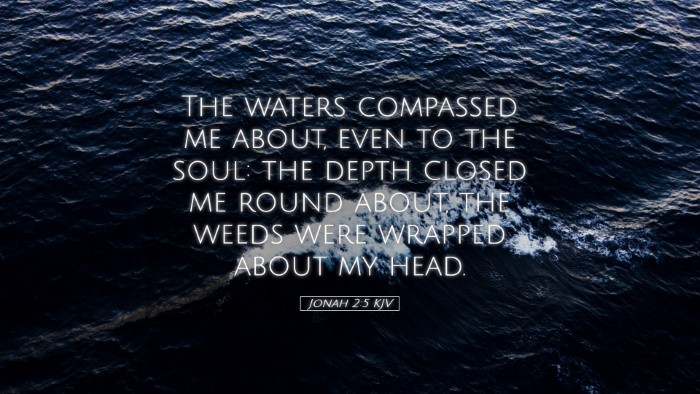Old Testament
Genesis Exodus Leviticus Numbers Deuteronomy Joshua Judges Ruth 1 Samuel 2 Samuel 1 Kings 2 Kings 1 Chronicles 2 Chronicles Ezra Nehemiah Esther Job Psalms Proverbs Ecclesiastes Song of Solomon Isaiah Jeremiah Lamentations Ezekiel Daniel Hosea Joel Amos Obadiah Jonah Micah Nahum Habakkuk Zephaniah Haggai Zechariah MalachiJonah 2:5
Jonah 2:5 KJV
The waters compassed me about, even to the soul: the depth closed me round about, the weeds were wrapped about my head.
Jonah 2:5 Bible Commentary
Commentary on Jonah 2:5
Verse Text: "The waters compassed me about, even to the soul: the depth closed me round about, the weeds were wrapped about my head."
Introduction
The verse Jonah 2:5 carries profound imagery illustrating Jonah's dire situation as he finds himself engulfed in the seas after his flight from God. It reflects themes of despair, regret, and the desperate need for divine rescue. This commentary synthesizes insights from esteemed public domain commentaries to provide a comprehensive understanding of this passage for pastors, students, theologians, and Bible scholars.
Contexts and Themes
Jonah, a prophet of God, was called to deliver a message of repentance to the city of Nineveh. However, he chose to flee from this divine mission, leading to his current plight where he finds himself in the depths of the sea. This passage encapsulates not just a physical struggle but also a profound spiritual crisis.
Desperation and Overwhelming Circumstances
Matthew Henry explains that Jonah’s experience in the water serves as a metaphor for spiritual despair. The imagery of being surrounded by waters signifies overwhelming trouble and the depths refers to a state of hopelessness. The phrase “even to the soul” emphasizes that this struggle is existential rather than simply physical.
Divine Discipline
Albert Barnes offers a perspective that Jonah’s predicament is a form of divine discipline. God’s hand, though seemingly harsh, aims at bringing Jonah to repentance. The pushing down into the depths of the sea mirrors situations in life where God allows circumstances to arise so we might recognize our need for Him.
The Weeds of Distress
Adam Clarke draws attention to the "weeds" that are described as wrapping around Jonah’s head. This vivid imagery represents not only physical entrapment but also mental anguish. Just as weeds can be an impediment to growth, so can despair entangle our thoughts and hinder our spiritual progress.
Spiritual Implications
The verse is not merely a recount of Jonah's experience but provides insights germane to the human condition in relation to sin and redemption. In moments of crisis, when one feels submerged by life's troubles, these lines serve as a reminder of the need to seek God for deliverance.
Repentance and Rescue
The depths of despair often lead to a turning point. Henry indicates that in the darkest moments, individuals can either spiral further into despair or cry out to God, which Jonah eventually does in the subsequent verses. The waters symbolize life's trials designed to lead us back to divine compassion and mercy.
The Character of God
Barnes asserts that God's willingness to deliver even those who fall away reflects His nature as merciful and gracious. This reinforces the message of hope that no one is beyond redemption. Jonah's experience assures believers of the possibility of restoration, no matter how far they may stray.
The Role of Prayer in Distress
Clarke emphasizes the importance of prayer in moments of suffering. Jonah’s cry from the depths demonstrates reliance on God. This illustrates that even in the most severe circumstances, returning to God in prayer is essential for seeking guidance and support.
Concluding Thoughts
In summary, Jonah 2:5 captures the essence of a desperate cry from a heart engulfed by sin and trouble. Each commentary provides unique insights into the emotional, spiritual, and theological layers embedded within this verse. For pastors and theologians, this passage serves as a rich source of reflection on God's persistent pursuit of His people, His willingness to confront us with our sins, and the ultimate call to return to Him in humility and contrition.
Applications for Modern Readers
- Acknowledge Despair: Recognize personal troubles and their potential to redirect attention to God's presence.
- Seek Repentance: Understand that turning to God is central to navigating through life's storms.
- Trust in Divine Mercy: Embrace the truth that redemption is available to all, irrespective of their failures.
- Engage in Prayer: Create a robust prayer life; let it be a lifeline during personal crises.


